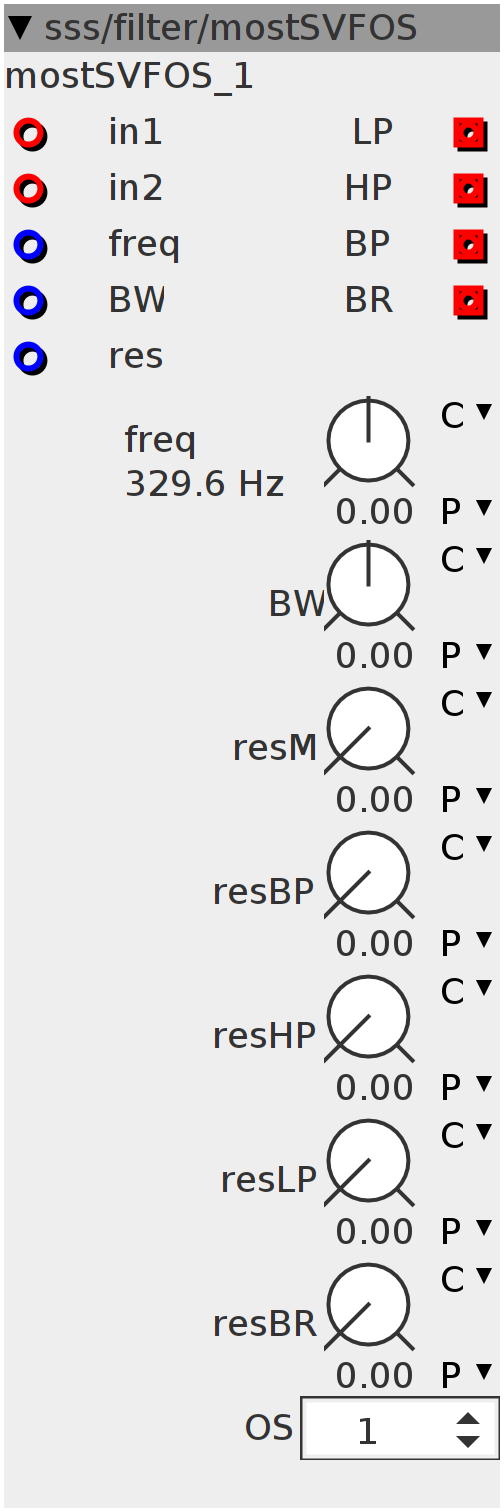mostSVFOS
oversampled multi-mode output filter. Use "rotationMix" module to morph through the available outputs easily. I kind of designed this filter from scratch, beginning with a simple 6dB LP filter and changing/adding codes to get the other filter modes. It result resembles the normal svf-filter, but there are some differences. First of all, the 4 modes each have their own resonance gain-control. This adds more BP-filtered signal to the respective filter-mode. Note though, that this is in the internal filter path, thus so also changing the response of the other filter-modes. This way, this filter can have lots of different responses for both filter-mode, frequency roll-off and resonance. The resBP/LP/HP/BR should be seen as settings, though can be altered live. The live resonance control should mostly done with the res-input and resM (main resonance gain controls)
Inlets
frac32buffer input
frac32buffer in2
frac32 cutoff frequency
frac32 BW
frac32 res
Outlets
frac32buffer output
frac32buffer HP
frac32buffer BP
frac32buffer BR
Parameters
frac32.s.map BW
frac32.u.map resM
frac32.u.map resBP
frac32.u.map resHP
frac32.u.map resLP
frac32.u.map resBR
int32 OS
frac32.s.map.pitch freq
int32_t LP;
int32_t HP;
int32_t BP;
int32_t BR;
int32_t resH;
int32_t resL;
int i;
int32_t pv1;
int32_t pv2;LP = 0;int32_t RES = __USAT(param_resM + inlet_res, 27) << 2;
int32_t resBP = ___SMMUL(param_resBP << 3, RES);
int32_t resHP = ___SMMUL(param_resHP << 3, RES);
int32_t resLP = ___SMMUL(param_resLP << 3, RES);
int32_t resBR = ___SMMUL(param_resBR << 3, RES);
int32_t f1;
int32_t BW = __SSAT(inlet_BW + param_BW, 28);
BW = BW > 0 ? BW : (BW >> 3) * 3;
int32_t width1;
int32_t width2;
if (BW > 0) {
width1 = __SSAT(param_freq + inlet_freq, 28) - BW;
width2 = width1 + BW;
} else {
width2 = __SSAT(param_freq + inlet_freq, 28) + BW;
width1 = width2 - BW;
}
MTOF(width1, f1);
int64_t f2;
MTOF(width2, f2);
f1 = f1 / param_OS;
f2 = f2 / param_OS;
int32_t s1 = (f1 - pv1) / param_OS >> 4;
int32_t s2 = (f2 - pv2) / param_OS >> 4;
int32_t p1 = pv1;
int32_t p2 = pv2;
pv1 = f1;
pv2 = f2;int32_t in2 = __SSAT(inlet_in2, 27) >> 1;
int32_t in1 = __SSAT(inlet_in1, 27) - in2;
for (i = 0; i < param_OS; i++) {
p1 += s1;
p2 += s2;
BP = __SSAT(
BP +
__SSAT(___SMMUL(BP, ___SMMUL(resBP << 4, (f1 >> 1) + (f2 >> 1))), 30),
31); // 2
BP = ___SMMLA((in1 - LP - BP) << 1, f2, BP); // 1
BR = __SSAT(
in1 - BP -
(___SMMUL(BP, ___SMMUL(+resBR << 4, (f1 >> 1) + (f2 >> 1))) << 5),
31); // 3
// BR=__SSAT(in1-BP,31);////////////
HP = __SSAT(BR - LP - BP -
(___SMMUL(BP << 3, ___SMMUL(resHP << 4, f2) << 1) << 4),
31); // 4
LP = ___SMMLA(
(BR - HP + (___SMMUL(BP << 3, ___SMMUL(resLP << 4, f1) << 1) << 4) - LP)
<< 1,
f1, LP); // 5
LP = __SSAT(LP, 31); // 6
}
outlet_LP = __SSAT(LP + in2, 28);
outlet_HP = __SSAT(HP + in2, 28);
outlet_BP = __SSAT(BP + in2, 28);
outlet_BR = __SSAT(BR + in2, 28);